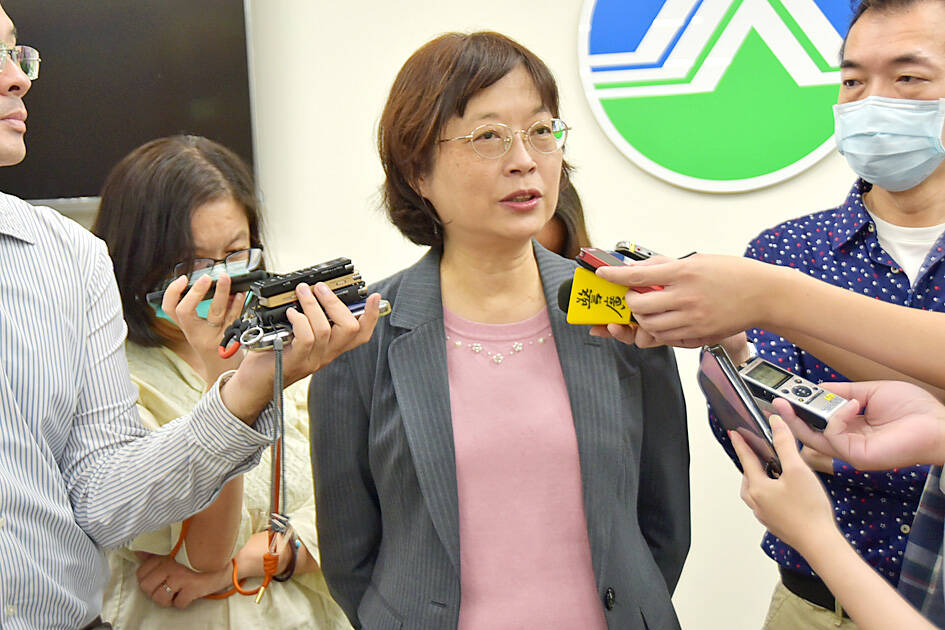The Ministry of Environment on Thursday announced regulations governing how entities can produce carbon credits or offset their emissions as part of Taiwan’s bid to hit its net zero emissions target.
Two new regulations would oversee how entities manage their carbon emissions: One governs “voluntary reduction projects” by businesses and government entities and the other one governs emissions generated by businesses on development and construction projects, the ministry said.
The first regulation states that entities that emit less than 25,000 metric tonnes of carbon dioxide — and are therefore not subject to the carbon fee — would be eligible to undertake “voluntary carbon emission reduction projects” that follow the internationally accepted measurable, reportable and verifiable guidance.

Photo: Wu Po-hsuan, Taipei Times
The reductions would need to have the characteristics of “additionality, avoiding overestimation, permanence, exclusive claim to GHG [greenhouse has] reductions, and avoiding social and environmental harms,” the Climate Change Administration Deputy Director-General Huang Wei-ming (黃偉鳴) said.
He said “additionality” meant that reductions would have to be made in addition to what entities are already doing to conform to the country’s existing environment-related legislation such the Air Pollution Control Act (空氣汙染防制法).
The voluntary projects would be categorized into the “removal type” or the “reduction or avoidance type,” with carbon removal meaning the elimination of existing carbon emissions, and carbon reduction or avoidance meaning the technology-based reductions of emissions.
Entities that emit more than 25,000 metric tonnes a year — the carbon fee payers — would not be eligible for the “voluntary projects,” as they are obligated to cut emissions, the administration said.
They would be able to purchase carbon credits produced by those who participate in voluntary projects to partially offset their carbon fees, and if they reach a certain reduction goal, they would be granted a preferential carbon fee rate.
The second regulation would require those setting up new factories emitting more than 25,000 metric tonnes a year, or high-rise construction projects, to partially offset their newly generated emissions, either by buying carbon credits from voluntary projects or by implementing other offsetting measures.
Offsetting measures generating “quasi-carbon credits” include replacing motorcycles running on fuel with electric ones, using high-efficiency air-conditioning and replacing old agricultural machines.
Huang said the objective of “quasi-carbon credits” is to shift the burden of promoting electric motorcycles and other energy-efficient products from government to big businesses.

US President Donald Trump said "it’s up to" Chinese President Xi Jinping (習近平) what China does on Taiwan, but that he would be "very unhappy" with a change in the "status quo," the New York Times said in an interview published yesterday. Xi "considers it to be a part of China, and that’s up to him what he’s going to be doing," Trump told the newspaper on Wednesday. "But I’ve expressed to him that I would be very unhappy if he did that, and I don’t think he’ll do that," he added. "I hope he doesn’t do that." Trump made the comments in

NOT AN OPENING: Trump’s violation of international law does not affect China’s consideration in attacking Taiwan; Beijing lacks capability, not precedent, an official said Taiwanese officials see the US’ capture of the president of Venezuela as a powerful deterrent to Beijing’s aggression and a timely reminder of the US’ ability to defeat militaries equipped with Chinese-made weapons. The strikes that toppled Venezuelan President Nicolas Maduro signaled to authoritarian leaders, including Chinese President Xi Jinping (習近平), US President Donald Trump’s willingness to use military might for international affairs core to US interests, one senior official in Taipei’s security circle said. That reassured Taiwan, the person said. Taipei has also dismissed the idea that Trump’s apparent violation of international law could embolden Beijing, said the official, who was not

A cold surge advisory was today issued for 18 cities and counties across Taiwan, with temperatures of below 10°C forecast during the day and into tonight, the Central Weather Administration (CWA) said. New Taipei City, Taipei, Taoyuan and Hsinchu, Miaoli and Yilan counties are expected to experience sustained temperatures of 10°C or lower, the CWA said. Temperatures are likely to temporarily drop below 10°C in most other areas, except Taitung, Pingtung, Penghu and Lienchiang (Matsu) counties, CWA data showed. The cold weather is being caused by a strong continental cold air mass, combined with radiative cooling, a process in which heat escapes from

Snow this morning fell on Alishan for the first time in seven years, as a strong continental cold air mass sent temperatures plunging across Taiwan, the Central Weather Administration (CWA) said. The Alishan weather station, located at an elevation of about 2,200m in central Taiwan, recorded snowfall from 8:55am to 9:15am, when the temperature dropped to about 1°C, the CWA said. With increased moisture and low temperatures in the high-altitude Alishan area, the conditions were favorable for snow, CWA forecaster Tsai Yi-chi (蔡伊其) said. The last time snow fell at the Alishan weather station was on Jan. 10, 2018, while graupel fell there